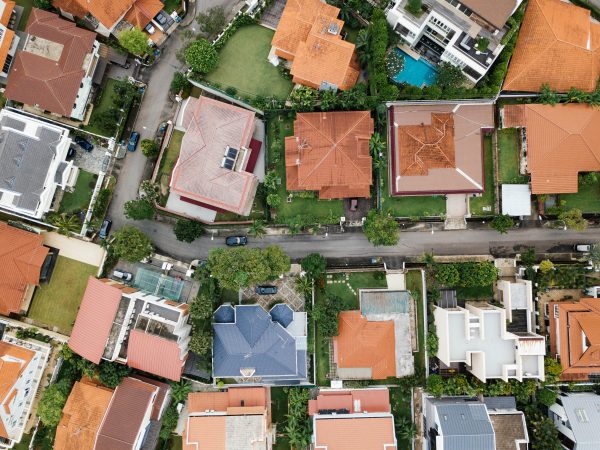
The division of the activity of renting homes to a new company is not subject to VAT, provided that they constitute an autonomous economic unit in the transferr, capable of developing a business activity.
Division transactions: VAT
A taxpayer is going to make a spin-off whereby he transfers his activity of leasing homes and premises to two newly created companies.
Faced with this new situation, several doubts arise:
- If these transactions are subject to VAT; and
- If it can continue to apply the reduced tax rate of 4%, which it has been applying as a company dedicated to renting homes, in newly created companies.
Therefore, the taxpayer transfers his query to the General Directorate of Taxes, which establishes the following:
- With regard to the subjection to VAT:
Regardless of the consignee, the transfer is not subject to VAT if it is accompanied by the necessary organisational structure of factors of production. That is to say, provided that they constitute or are capable of constituting an autonomous economic unit in the transferor, capable of carrying out a business or professional activity by their own means, regardless of the tax regime that may apply to that transfer in the field of other taxes.
In another case, the transfer is subject to VAT,and each element must be taxed independently according to the rules that are applicable to it. However, the transfer of properties that constitute homes,as in this case, are subject to and exempt from VAT when they take place after their construction or rehabilitation is completed (LIVA art.20.uno. 22º).
- In relation to the application of the 4% tax rate:
The application of the 4% tax to the acquisition of homes by entities engaged in leasing requires two conditions:
- that the acquiring entity applies the special regime of the IS of entities dedicated to the rental of housing; and
- that the rents derived from the subsequent lease of the acquired house are applicable the bonus in the full contribution of 85% (LIS art.49).
Thus, it may happen that there is an operation of division of a set of houses together with their material means in favor of:
- (a) An entity that applies the special regime for the rental of dwellings. In this case, the tax rate of 4% should be applied provided that the entity acquiring the dwellings has the intention,confirmed by objective elements that must concur at the date of the acquisition, to dedicate the properties that it acquires in the year following the lease and will be entitled to the bonus of 85% with respect to the rents that will be received from the aforementioned lease.
- b) SOCIMI (Listed Real Estate Investment Corporations). In this case, if the houses are kept leased in the entity to which the division is addressed, for a period of three years calculated from the date on which such dwellings were first leased by the transferring company applying the special housing rental scheme of the IS, and provided that the rents derived from said lease become entitled to the 85% bonus , the tax rate of 4% applied in the acquisition of homes is not corrected.

Transfer of business in progress: VAT
The transfer of a set of tangible and, where appropriate, incorporeal elements which, forming part of the taxable person’s business or professional assets, constitute an autonomous economic unit for the transferr capable of carrying out an economic activity by his own means, is not subject to VAT. It does not include the mere transfer of property.
Although they are business transactions, the Law excludes them from taxation for reasons of simplification (the transfer may include numerous goods and services, to which their own taxation should be applied separately), and for economic reasons (avoiding the transfer to the acquirer of an excessive tax burden that could take time to recover).
For case law non-subjection (which it refers to in its resolutions as ‘non-delivery’) does not occur when it is a mere transfer of goods, but when it comprises a set of goods sufficient for the transferee to be able to continue an economic activity on a lasting basis (CJEU 10-11-11, C-444/10, in the same sense TEAC, 21-3-18); for its part, for the Supreme Court the decisive thing is that the “necessary” elements to develop an economic activity under the ownership and organization of the acquirer are transmitted (TS 28-11-13).
Non-subjection includes the total transfer of assets to a single acquirer and partial transfers to several acquirers, provided that each transfer constitutes an autonomous economic unit, unless the transfer is made for the sole purpose of the liquidation of the assets (CJEU 27-11-03, Case Zita Modes Sàrl C-497/01).
In the case, all merger processes by absorption, division of companies and non-monetary contributions of branches of activity are covered. The non-subjection occurs independently of the tax regime that corresponds to the transfers in the field of other taxes (special regime in the Corporation Tax, application of the Tax of Onerous Property Transfers -TPO-).
It is also envisaged that:
- for the purposes of non-subjection, it is irrelevant whether or not the acquirer continues the same activity as the transferor, provided that the acquirer proves the intention to maintain the acquired assets related to the development of an activity;
- goods which are subsequently subject to disaffection from the activity shall be subject to VAT.
The regulations do not specify anything about the minimum period that the goods must be affected by the activity without losing the benefit of the non-subjection, so logical criteria must be applied that allow to prove the intention of the acquirer to maintain the affectation for a reasonable period.
The properties included in the global transfer of assets not subject to VAT are taxed by TPO (Tax on Onerous Property Transfers) as soon as the operation conforms to the taxable event of this tax.
The following transmissions are excluded from non-subjection:
- (a) Those that constitute a mere transfer of property or rights.
- b) Those carried out by those who only have the status of entrepreneurs for making deliveries or services that involve the exploitation of a good with a view to obtaining continuous income over time (in particular, the lessors of goods, VAT art.5.uno.c), when such transfers have as their object the mere transfer of goods.
- c) Those carried out by those who only have the status of entrepreneurs for occasionally carrying out the operations of urbanization of land, or the promotion, construction or rehabilitation of buildings intended for sale or assignment by any title (LIVA art.5.uno.d).
If you have any questions or need any clarification, you can contact our advisors to help you resolve them.








